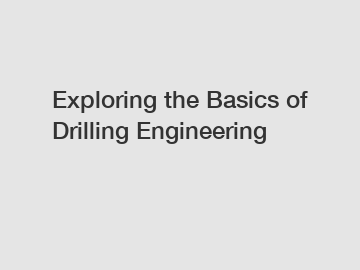Exploring the Basics of Drilling Engineering
Exploring the Basics of Drilling Engineering.
Drilling engineering is a crucial part of the oil and gas industry that involves the design and implementation of drilling operations to extract underground resources. It requires a comprehensive understanding of various engineering principles and technologies to ensure safe and efficient drilling processes. In this article, we will explore the basics of drilling engineering and its importance in the extraction of natural resources.
Overview of Drilling Engineering.

Drilling engineering involves planning, designing, and supervising the drilling of wells to extract oil or gas from underground reservoirs. It encompasses various aspects, including well design, drilling fluid selection, casing and cementing operations, drilling equipment, and well control procedures. Drilling engineers work closely with geologists, geophysicists, and drilling contractors to optimize drilling operations and minimize risks.
Key Concepts in Drilling Engineering.
1. Well Design: Well design is a critical aspect of drilling engineering, as it determines the overall success of the drilling operation. The design includes the selection of drilling locations, well trajectories, casing sizes, and completion techniques. Engineers need to consider geological and reservoir data to create an optimal well design that maximizes resource recovery.
2. Drilling Fluids: Drilling fluids, also known as drilling mud, play a crucial role in drilling operations. They help cool and lubricate the drill bit, carry rock cuttings to the surface, control formation pressures, and provide stability to the wellbore. Engineers must select the right type of drilling fluid based on the wellbore conditions and formation characteristics.
3. Casing and Cementing: Casing and cementing operations are essential to protect the wellbore and prevent fluid migration between different formations. Engineers design casing strings to support the wellbore walls and isolate production zones. Cement is then pumped into the casing annulus to secure the casing in place and create a barrier against fluid migration.
4. Drilling Equipment: Drilling engineers are responsible for selecting and maintaining drilling equipment, such as drill bits, drilling rigs, mud pumps, and downhole tools. They ensure that the equipment is suitable for the operational requirements and meets safety standards. Regular maintenance and inspection of equipment are essential to prevent downtime and ensure smooth drilling operations.
Importance of Drilling Engineering.
Drilling engineering plays a vital role in the exploration and production of oil and gas reserves. By applying engineering principles and technologies, drilling engineers can optimize well construction, maximize production rates, and minimize costs. Efficient drilling operations are essential for the economic viability of oil and gas projects and the overall energy industry.
Conclusion.
In conclusion, drilling engineering is a multifaceted discipline that involves the planning, design, and execution of drilling operations in the oil and gas industry. It encompasses various aspects, including well design, drilling fluids, casing and cementing, and drilling equipment. By understanding the basics of drilling engineering, professionals can contribute to the successful extraction of natural resources and the sustainable development of energy projects.
Contact Us.
If you are interested in learning more about drilling engineering or require professional assistance for your drilling projects, please feel free to contact us. Our team of experienced engineers is ready to provide expert guidance and support for your oil and gas operations.
Are you interested in learning more about wellhead api 10d ball screw gate valve exporter, mud pump parts name, elevator links drilling services? Contact us today to secure an expert consultation!



